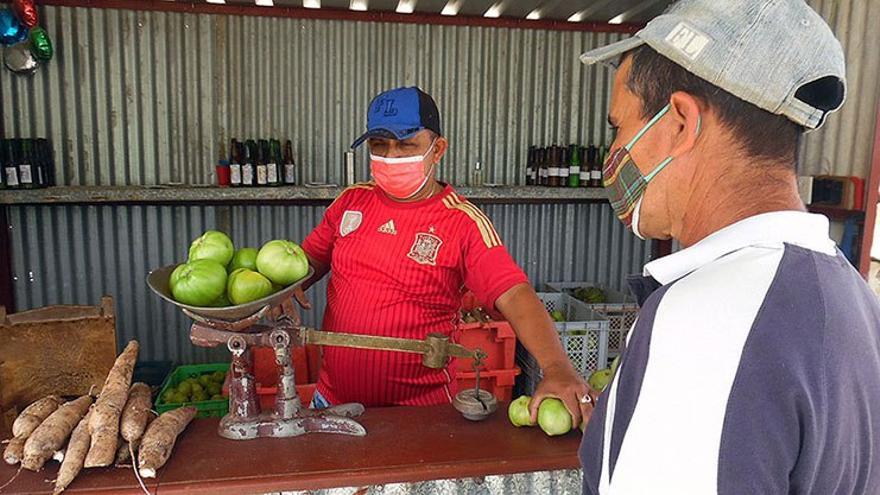
![]() 14ymedio, Havana, April 17, 2021 — On Thursday the Cuban government promised to expand the private sector according to details released by press office of the Council of Ministers, several of whose officials held a meeting with self-employed workers on the eve of the Eighth Congress of the Communist Party.
14ymedio, Havana, April 17, 2021 — On Thursday the Cuban government promised to expand the private sector according to details released by press office of the Council of Ministers, several of whose officials held a meeting with self-employed workers on the eve of the Eighth Congress of the Communist Party.
“At this time, the process of creating the legal framework for an unprecedented expansion of self-employment is about to be concluded. This will provide opportunities for self-employed workers in many more trades and occupations, with the possibility of combining several under the same license,” Prime Minister Manuel Marrero said at the meeting.
Marrero acknowledged that there is “a challenge ahead” and insisted that the government, “while reaffirming the role that state-owned business has to play in the nation’s socialist economy, also recognizes the priority and importance of consolidating and developing non-governmental management systems, and will continue to work in the search for solutions” to address the economic crisis the country is experiencing.
Not surprisingly, Cuba’s leaders attribute the the nation’s complex financial situation to the U.S. embargo* and the Covid-19 pandemic.
Miguel Díaz-Canel, who participated in the meeting, also insisted that “the enemy is tireless in its determination to disrupt the relationship between the public and private sectors of this economy.” He added, “We will not surrender the private sector to the enemy.”
The president-designate recognized the contribution of self-employed workers in confronting the pandemic, citing their role in the manufacture and distribution of masks as an example. “When the country had no surgical masks,” he recalled, “many non-state workers — with their own fabric and at almost no charge — made the masks our population needed to combat Covid.”
However, Raúl Castro’s remarks during the first day of the Party Congress, which began on Friday in Havana, were not very flattering. According to Castro, it seems that “the desire for higher income encourages in some the desire for a privatization process that would sweep away the foundations and essential character of the socialist society built over more than six decades.”
The outgoing Communist Party leader added that others hope to “do away with the socialist principle of state monopoly of foreign trade, demanding that private commercial importation be legalized, with the aim of creating a non-state system of foreign trade.”
Castro warned that “these are issues that cannot be left to the naivety of leadership cadres and party members.” He added, “There are limits that we cannot exceed because the consequences would be irreversible. Doing so would lead to strategic errors, the very destruction of socialism and, ultimately, of national sovereignty and independence.”
During Thursday’s meeting, the economics minister, Alejandro Gil Fernández, said that “a trend towards stability and growth is being maintained” as evidenced by the fact that “more than 600,000 people are self-employed and that Cuba now has 396 non-agricultural cooperatives in operation.” He added, “What we are doing is recognizing the contribution of micro, small and medium-sized businesses to the strategy for transforming the country’s production capacity and foreign investment, and for satisfying consumer demand.”
Felipe Ponce Ceballos, director of the Technical, Personal and Home Services in Pinar del Río, was gushing in describing the company as a “local development project offering recovery services” in that city: “I can tell you they are among the best, high-quality and consistent services there are.”
Iván Barreto, director of Cinesoft, a company that produces audiovisual educational material and teaching aids, was equally adamant: “If the nation’s public sector cannot find space in the socialist economy for private business, we aren’t going to see any economic development.” In a reference to Cinesoft, he observed, “Private sector involvement in the world of information technology has created a partnership without which we would not have many of the resources used in Cuban classrooms today”
“Today’s meeting would have been unthinkable on December 4, 2018, a few hours before a series of regulations were to take effect that would have seriously damaged the private sector and the national economy, were unexpectedly suspended,” Oniel Díaz writes on social networks. Díaz, a co-founder of Auge, a consulting firm for entrepreneurs, observes, “Lifting the ban on certain types of employment activities puts us at the cusp of a historic moment.”
The meeting with small business owners the day before the congress was, according to Díaz, “confirmation that there is no going back.” He adds, “It should not be interpreted as being a message only for the general public. It’s also intended for those who would halt, hinder or misapply.”
“The actions being taken are consistent with the governing documents of this country. They may be boring to some and sound like oratory to others but they are not.” He adds, “They speak not only to us but to those who toil in silence and those who oppose the system. Right now, time is the most important variable and the one that will indicate if this is a true expression of political will. When? How? We will measure success by how both of these questions are answered.”
*Translator’s note: Cuban government officials routinely refer to the U.S. embargo as ’the blockade.’
____________
COLLABORATE WITH OUR WORK: The 14ymedio team is committed to practicing serious journalism that reflects Cuba’s reality in all its depth. Thank you for joining us on this long journey. We invite you to continue supporting us by becoming a member of 14ymedio now. Together we can continue transforming journalism in Cuba.
